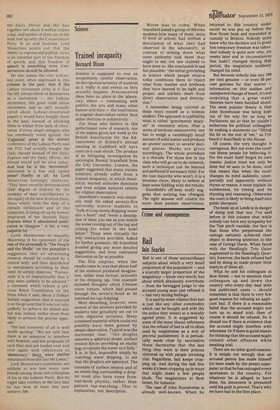Crime and cpnsequences
Bail
lain Scarlet
Bail is one of those extraordinary subjects about which a very small proportion of the population and a scarcely larger proportion of the magistracy know very much; but about which absolutely everybody from the bewigged judge to the accused young man just refused it has very strong feelings.
It is said by some villains that bail is just like any other commodity which can be bought and sold (by the police they mean) at a mutally agreed price. It is suggested by some of the more liberal reformers that the refusal of bail is all to often used by magistrates as a sort of pre-trial punishment. It is periodically made clear by successive Home Secretaries that the last thing they want is their prisons cluttered up with people awaiting trial. Regardless, bail keeps cropping up. And during the last few weeks it's been cropping up in ways that might . make a few people blush. The magistrates at Bow Street, for instance.
The case of John Stonehouse is already well-known. When he returned to this country under escort he was put up before the Bow Street beak and remanded in custody to Brixton. Nobody quite knew why the decision not to grant him temporary freedom was taken. And nobody is quite sure why, six weeks later and in circumstances that hadn't changed during that period, the magistrate suddenly changed his mind.
But because nobody has any 109 per cent genuine or even 50 per cent genuine for that matter information on this sudden and unexpected change of heart, it's not surprising that a great many theories have been bandied about. The most popular theory is that John Stonehouse was being kept out of the way for as long as Parliament sat so that he couldn't embarrass his political colleagues by making a statement (or "lifting the lid on the rest of 'em," as I've heard it described) in the House.
Of course, the very thought is outrageous. But not even the court can blame people for believing it. For the court itself forgot its own maxim: justice must not only be done but be seen to be done. And that means that when the court changes its mind suddenly, unexpectedly and apparently without rhyme or reason, it must explain its suddenness, its timing and its rhyming and reasoning. Otherwise the court is likely to bring itself into public disrepute.
The beak up at Leeds is in danger of doing just that too. I've said before in this column that while nobody can have any sympathy for the Test pitch vandals, the fact is that those who perpetrated the outrage certainly achieved their object in drawing attention to the case of George Davis. When faced with the Headingly Trio (later augmented to the Headingly Quartet), however, the beak refused bail and by doing so made proper little martyrs of them all.
What he and his colleagues at Bow Street not to mention their colleagues up and down the country who every day deal with less publicised cases should remember is that there is very few good reasons for refusing an applicant bail. If there is a reasonable belief that the accused might not turn up to stand trial, then of course it should be refused. So it should too if there is evidence that the accused might interfere with witnesses, Or if there is good reason for thinking that the accused might commit other offences while awaiting trial.
There are no other good reasons. It is simply not enough that an accused person has made himself (or been made by the press) unpopular; or that he has outraged every sportsman in the country. For whatever he is alleged to have done, his innocence is presumed until his guilt is proved. That's why we have bail in the first place.


































 Previous page
Previous page